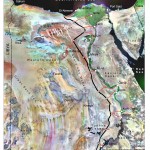
Mosaic of 65 images obtained by NASA's Landsat Earth-orbiting satellite. The northern half of the proposed Development Corridor runs through what may have been an ancient delta of the Nile.
A visionary plan for a “Desert Development Corridor” in Egypt, researched and created by Boston University geologist Dr. Farouk El-Baz, has been adopted by the country’s new government as its flagship program. According to El-Baz, the plan – which includes the construction, along 1,200 kilometers, of a new eight-lane superhighway, a railway, a water pipeline, and a power line – would open new land for urban development, commerce, agriculture, tourism and related jobs, and installs new transportation routes to an undeveloped area of desert running parallel to the Nile River Valley and Delta.
The Egyptian-born El-Baz, director of BU’s Center for Remote Sensing, has for decades been researching Egypt’s deserts using satellite imagery and space-age techniques. He had originally proposed the plan to Egypt’s former government in 1985. Following the recent revolution, El-Baz traveled to Egypt to meet with government leaders and the general public to explain the plan that would reinvigorate the country and expand the living space near the banks of the Nile River.
“This project includes opening up a vast strip of Egypt just west of the narrow living area along the Nile that can be utilized in establishing housing communities, expanding agriculture, initiating industrial compounds, and enhancing the potential of tourism,” said El-Baz. “Most importantly, the activity opens up the possibility of a bright future for the young generation. One that is full of new opportunities where they may innovate and excel.”
El-Baz’s idea has two components: first, an axis composed of a north-south running eight-lane highway, a high-speed train, an electricity line, and a water pipeline for human consumption along the 1,200 kilometer strip of desert; and second, 12 east-west axes that connect large population centers to the north-south corridor.
El-Baz has suggested to the government that the project be run by an internationally recognized Board of Trustees and initial funding should be sought from bonds to be offered to the Egyptian people – the “owners” of the project, according to El-Baz.
Details of the project have been laid out in El-Baz’s book (Development Corridor: Securing a Better Future for Egypt), published in Cairo in 2007. The book served as the basis for technical evaluation and feasibility studies, the latter indicating that the infrastructure of the project would cost approximately $24 billion.
Contact El-Baz: 617-353-5081 or farouk@bu.edu.